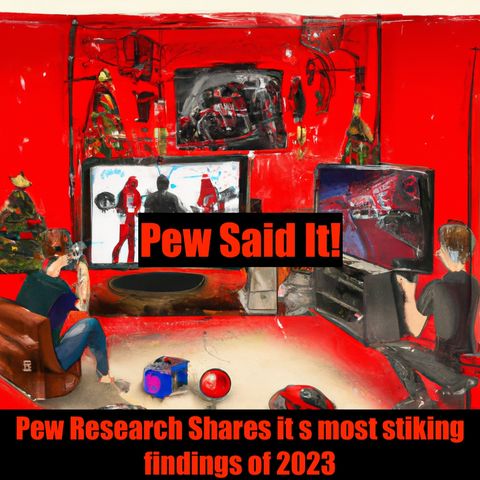The year 2023 has come to a close, leaving behind a tapestry woven with vibrant threads of change and persistent tensions. To understand the intricate knots and shifting patterns within this societal fabric, we turn to the insightful lens of the Pew Research Center's "Striking Findings" report. This document, brimming with data and observations, serves as a crucial barometer of the American mood, offering a glimpse not just at the present, but also at the trajectory of our future. 1. Generation Alpha Takes Flight: A Youth Embracing STEM and the Cosmos One of the most striking shifts revealed by the report is the burgeoning fascination of Generation Alpha with space exploration and STEM fields. Compared to previous generations raised on dial-up modems and Tamagotchis, these digital natives dream of celestial journeys and tinker with robots in their garages. This surge in interest, fueled by a confluence of factors like increased visibility of private space programs and a growing emphasis on STEM education, suggests a potential future where America's leadership in scientific and technological pursuits is renewed. However, crucial questions remain. How can we translate this youthful enthusiasm into concrete learning opportunities and career pathways? How can we ensure equitable access to STEM education for all children, regardless of background or circumstance? 2. The Digital Wild West: Guns and Tweets, a Nation Divided Another stark finding paints a picture of a deeply divided society, where the online discourse surrounding gun control resembles a digital Wild West shootout. Social media platforms, once seen as playgrounds for cat videos and vacation selfies, have become battlegrounds for fervent arguments, with statistics and hashtags wielded like six-shooters. This online fervor mirrors the profound societal disagreements regarding gun violence and regulations, with the report highlighting a persistent 52% to 47% split between those favoring stricter laws and those opposing them. This stark divide begs for introspection. How can we navigate this digital wilderness, fostering respectful dialogue and understanding amidst the polarization? What role can media platforms play in mitigating misinformation and promoting informed discourse on this sensitive topic? 3. Science: A Double Helix of Admiration and Apprehension The report reveals a curious ambivalence in America's relationship with science. On the one hand, we revel in the fruits of scientific advancement, from smartphones to gene-edited avocados. On the other hand, anxieties linger about the potential ethical and societal consequences of scientific progress. This duality is reflected in the data, with a majority expressing trust in scientists but harboring concerns about the potential risks of research. This complex dynamic necessitates further exploration. How can science communicators bridge the gap between public perception and scientific reality? What role can educational institutions play in fostering a more informed and nuanced public understanding of science, its benefits, and its potential challenges? 4. Shifting Sands of Spirituality: Faith in a Secular Age The Pew report presents another intriguing finding: a resurgence of interest in spirituality within a society often characterized as increasingly secular. This rise isn't about a mass exodus back to organized religion, but rather a personal search for meaning and purpose, often expressed through meditation, mindfulness practices, or nature connection. This trend resonates with broader cultural shifts towards self-care, environmental consciousness, and a reevaluation of traditional structures. It necessitates further inquiry. What factors are driving this renewed interest in spirituality? How is it shaping people's individual and communal experiences? Does it signal a potential societal shift toward a more holistic understanding of well-being and connection? Looking Beyond the Data Points: The Pew Research Center's "Striking Findings" report is not merely a collection of statistics and graphs. It is a portrait of a nation in flux, a society grappling with internal tensions and navigating unforeseen challenges. By delving deeper into the trends it highlights, we gain invaluable insights into the values, anxieties, and aspirations that define the American zeitgeist. This understanding is crucial, not just for interpreting the present, but also for shaping the future. The questions raised by the "Striking Findings" report transcend headlines and social media debates. They invite us to engage in deeper conversations, to bridge divides, and to collectively reimagine the fabric of American society. Only through such sustained introspection and collaborative dialogue can we navigate the intricate tapestry of change and forge a future that reflects the hopes, dreams, and values we hold dear. Thanks for listening to Quiet Please. Remember to like and share wherever you get you podcasts.
show less


Comments